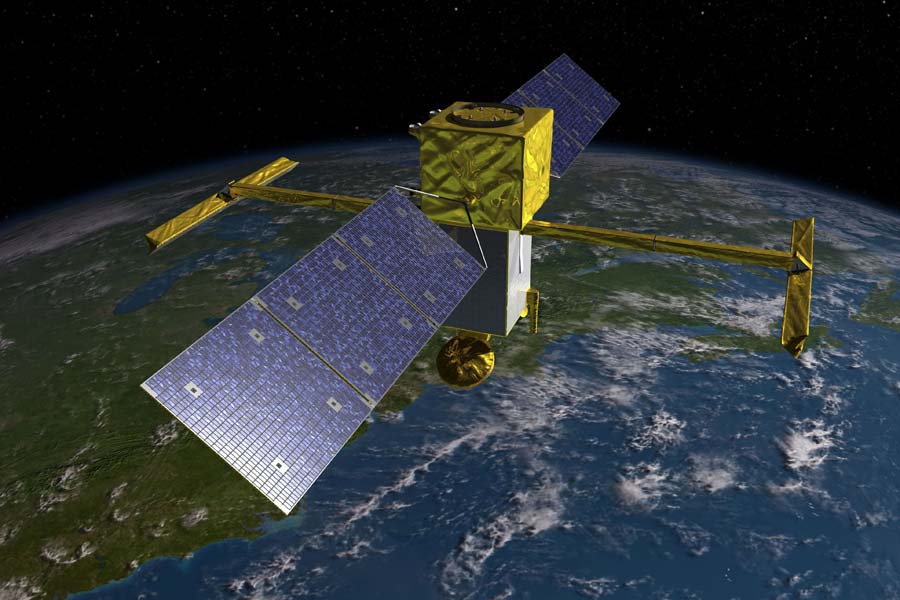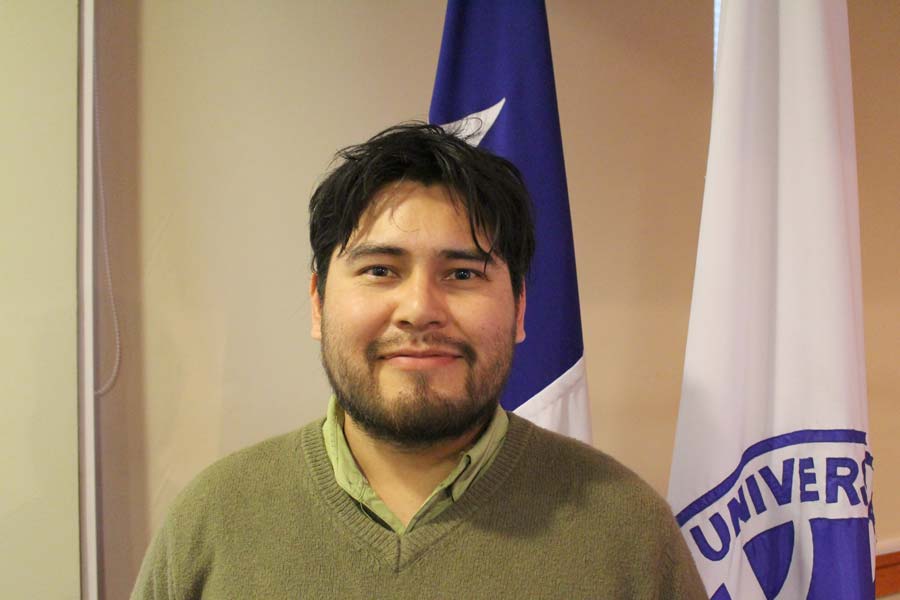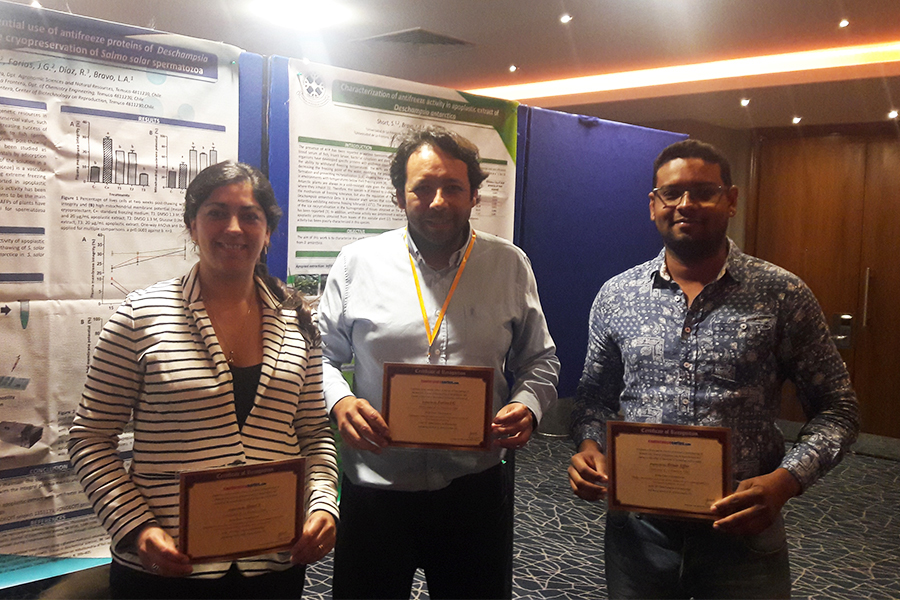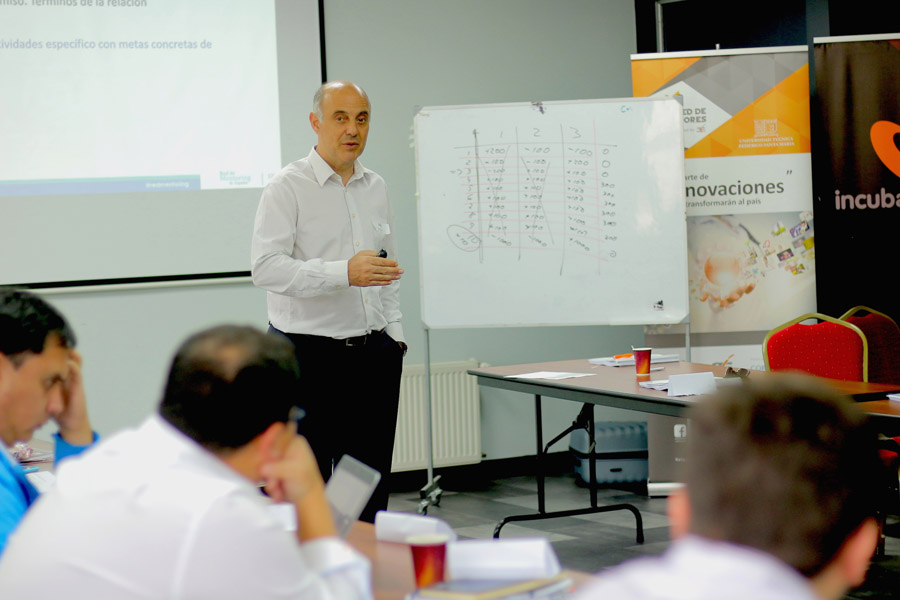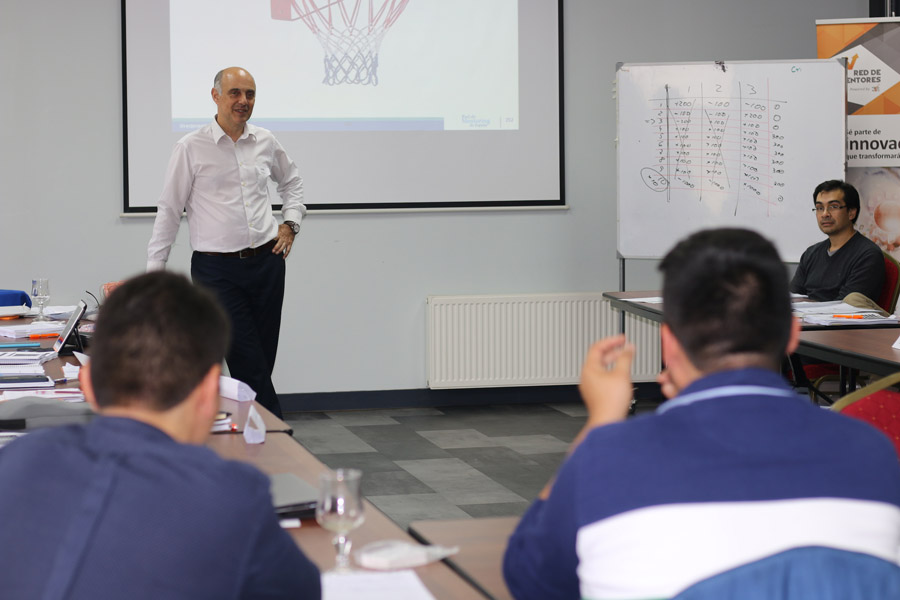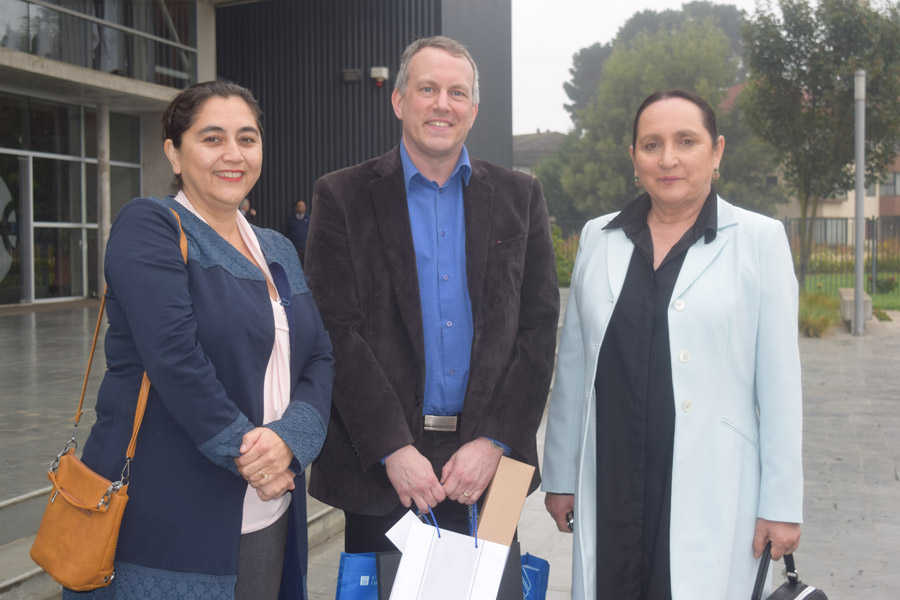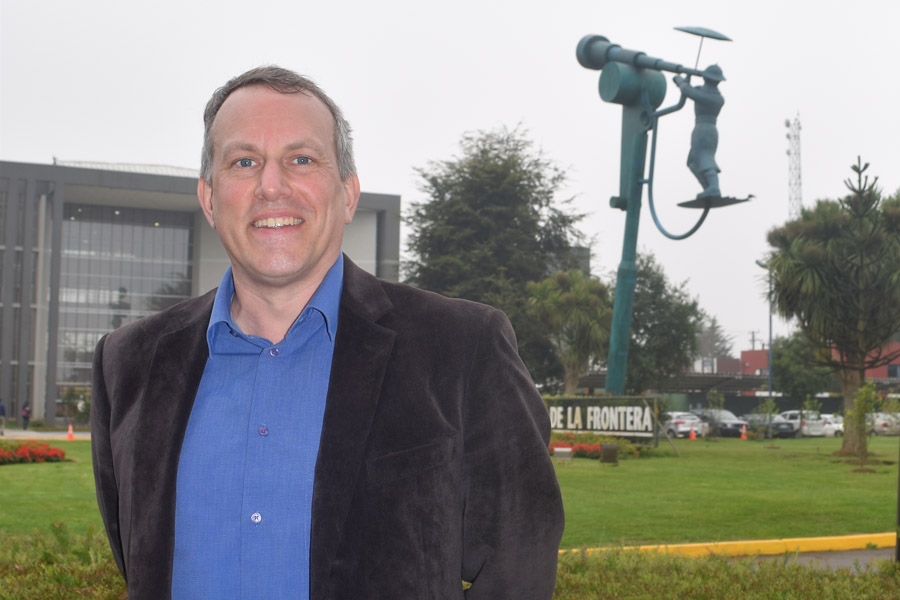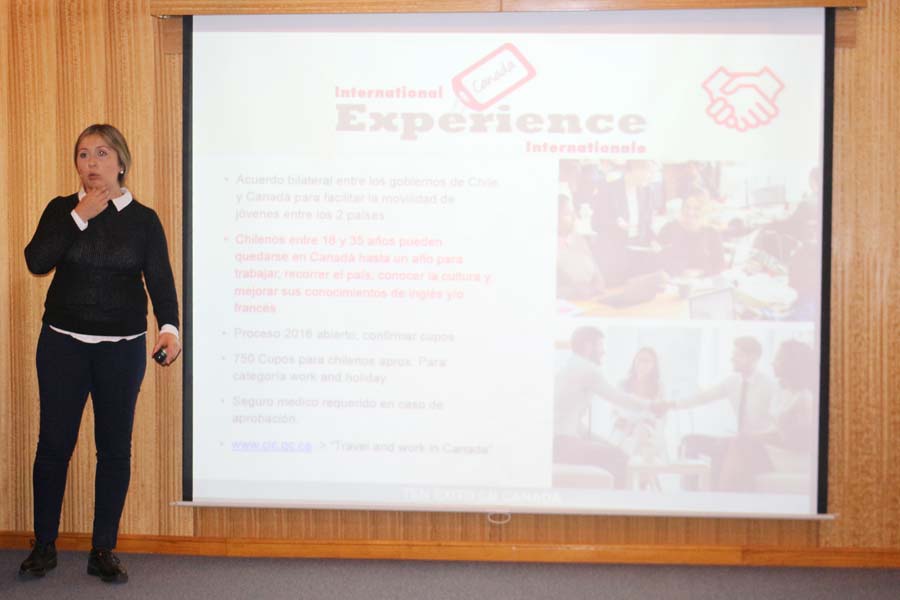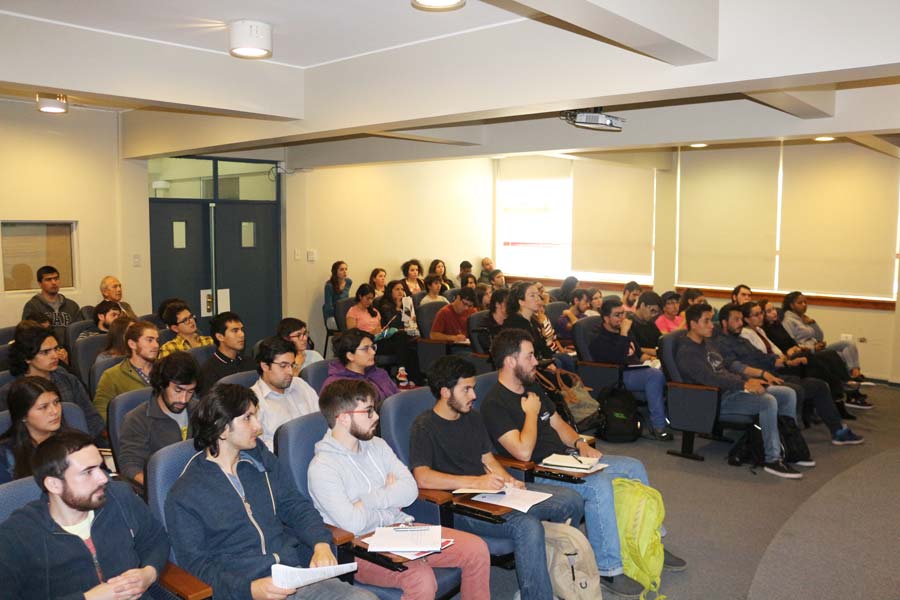|
Within a work alliance between the Chilean Universidad de Concepción (UDEC) and the UFRO, with the help of Dr. Rodrigo Abarca del Rio, the UFRO collaborates on this mission and provides the training of advanced human capital capable of analyzing the data provided by SWOT, information that will allow to assess the existing water resources in Chile at the basins level. |
The SWOT (Surface Water and Ocean Topography) mission is a space mission led by NASA (National Aeronautics and Space Administration) and the French CNES (National Center for Space Studies). Its objective is the better understanding of the world's oceans and its terrestrial surface waters. The mission will be launched in 2021.
 Written by: Daphne Bormann Written by: Daphne BormannFaculty of Engineering |
|
Dr. Jorge Farías and the students Stefania Short and Bryan Effer presented their research advances related to an international project for the production of a leukemia drug and the characterization of antifreeze activity in apoplastic extract of Deschampsia Antarctica. |
The motivation for the participation of the Doctoral Program in Science with specialization in Applied Cellular and Molecular Biology of the Universidad de La Frontera in this international event in London with presentations by Dr. Jorge Farías and the students Stefania Short and Bryan Effer was to share their scientific advances and create international links. It is also worth to mention that the resume of the presented studies have been published in the Journal of Biotechnology & Biomaterials. The studies are called:
 Written by: Dirección de Comunicaciones Written by: Dirección de ComunicacionesThis email address is being protected from spambots. You need JavaScript enabled to view it. |
|
The Program of international certification was organized by the Mentoring Network of the 3IE Institute at the Technical University Federico Santa María in Spain, and carried out by Mentoring Spain, supported by CORFO (Production Development Corporation) and IncubatecUFRO. |
After participating in an unprecedented initiative in the South of Chile, which promotes the development of necessary skills and competencies to lead a mentoring process in an entrepreneurial environment, professionals and teachers of the Macro Faculty of Engineering were internationally certified. The Program of International Certification in Mentoring was organized by the Mentoring Network of the 3IE Institute at the Technical University Federico Santa María in Spain, and carried out by Mentoring Spain, supported by CORFO and IncubatecUFRO (the Business Incubator of the Universidad de La Frontera). During two days, professionals and teachers of the Macro Faculty of Engineering of the Universidad de La Frontera, the Universidad Bio Bio (UBB), IncubatecUFRO, and other organizations related to entrepreneurship and innovation in this Region were part of this activity directed by Julio Diaz, director of Mentoring Spain. In different dynamics, the expert gave details about the methodologies and tools that are necessary to lead a mentoring process in the best way. “With this certification, we are training the participants in eleven basic competencies a good mentor needs and in the processes and steps they have to follow at the moment of mentoring. The training system we use is innovative – with dynamics, exercises and role-plays. We think this is very effective, since they experience what they are doing and have to put it into practice afterwards. This is what we evaluate at the end”, he explained. “Once the training is over, the participants have to take a test about their knowledge in order to verify if they internalized what they did in class. Afterwards, we evaluate a mentoring practice. We get in contact with the entrepreneur they have been supporting or will support when the training ends, and what we do is to check if they are doing an effective mentoring process”, he added. PARTICIPANTS The academic staff member of the UFRO Macro Faculty, Juan Pablo Cárdenas, said that this activity “opens a door for us and our work we do at the academy. Here, we give them structures and concepts that permit us to do correct work and to project it, with methodologies and techniques that help us to optimize the processes and accompany someone who wants to start a business or develop a project in a good way.” For the project engineer of the Node for Innovation and Technology of the UBB, Fabian Zambrano, the acquired experience in the program will help to do better work accompanying the entrepreneurs the Macro Faculty supports. “For the students, the support by a mentor will permit them to create a better business model, to define the idea well and to transform it into a product that can be commercialized. We want to be a support for them in this process. Therefore, we think that this certification will position us and permit us to build capacities in this field”, he concluded. Written by: Mauricio Antivil
Enginering Project 2030 |
|
The Doctor in English Philology and director of the Program in English Philology at the University of Tampere, Mark Kaunisto, travelled from Finland to Temuco and met with authorities and professionals of the Universidad de La Frontera in order to give a new impetus to the agreement. |
The University of Tampere is located north of Helsinki in the city of Tampere and has more than eleven thousand undergraduate students, two thousand more than the Universidad de La Frontera. Both higher education establishments signed a Cooperation Agreement, five years ago, which stipulates the exchange of Finnish teachers who come to our University to teach and strengthen the English skills of our undergraduate students, while they get to know the local culture and learn Spanish. In order to give a new impetus to this agreement, the Doctor in English Philology and director of the Program in English Philology at the University of Tampere, Mark Kaunisto, travelled from Finland to Temuco. He met with UFRO authorities and professionals to address the specific agreement that, in August 2018, will bring two English teachers of the University or Tampere to the UFRO for the first time. They will be collaborating at the Language Coordination Center (CODI) for undergraduate students and in the English Teaching Program. At the same time, Dr. Mark Kaunisto expressed his satisfaction with how the English program is developed for all UFRO study Programs. “In recent times, we have been contacted by universities from different parts of the world and that created trust regarding the result of our work, and the interest in supporting the Universidad de La Frontera came up because it is part of our institutional policy to share the results of our experience with the rest of the world”, he explained. “I was anxious to see how the English language is taught here and, in this context, I was impressed when I saw the classroom equipment and also the space and big local development of the educational material the Language Coordination Center works with, such as the platform and educational videos for English teaching. They involve methodologies in the context of real life for the students in this country”, Kaunisto pointed out. THE FINNISH SECRET Finland is a country with a very good reputation worldwide, for its education but also for its quality of life. In addition, according to the Annual World Happiness Report of 2018, an initiative of the UN, the Nordic country is the happiest in the world. Apart from that, its population of more than five million people is at least trilingual, since Finnish and Swedish are the native languages and the English language is learnt from a young age. The academic staff member of the UFRO Department of Language, Literature and Communication and coordinator of the Minor in English, Lilian Gonzalez, expressed her concern about the poor command of English in the country and emphasized the importance of this agreement between both universities. “The level of English has to be significantly improved. In Finland, a person who finishes secondary education is trilingual, with Finnish, Swedish and English. Therefore, their standards are very high. At the same time, the University of Tampere showed its interest and is open to this concept, because several of its teachers have come to our University to work with us, with excellent results and a good evaluation by the students.” How do they teach English in Finland? And why do they have such a good language command? These were the questions Dr. Mark Kaunisto has been asked and he explained that they do intensive teaching starting in elementary education. “Finnish and Swedish are the official languages and English is a foreign language we start teaching intensively in elementary education. One of the main motivations the kids have for learning English is that the media uses this language and it is not translated. For example the shows on television do not have subtitles and therefore it is normal for children to see and hear the programs in English. This way, they also train their sense of hearing and that is an important support for their progress at school.” “And since this immersion in the English language happens in such a natural way, it facilitates the learning process of other languages, such as Spanish, German or French. It is like sports: if you already play soccer, it is easier to learn how to play basketball or tennis. The second language is difficult to learn, but the next ones are easier, since your brain is already trained and flexible, and also your attitude”, Kaunisto assured.
|
|
In an information seminar, the representative of the Canadian embassy in Chile informed about the most important facts to consider when the students apply to scholarships and about the opportunities for studying in Canada. The seminar was organized by the UFRO International Affairs Office and the National and International Student Mobility Office. |
Canada is among the top ten countries in education worldwide and has a high index of happiness. It is a country that does not stop to grow as an attractive destination for undergraduate and postgraduate students. It has also been inspiring for Chilean students and young professionals who decided to join this adventure in a place that is more than 10 thousand kilometers away from Chile. Taking the interest and agreements the Universidad de La Frontera has with different Canadian higher education institutions into consideration, the coordinator of Academic Affairs of the Canadian embassy in Chile, Priscila Lopez, visited the Andrés Bello Campus and held an information seminar. “To study in Canada means to enter into a prestigious atmosphere. The Canadian universities are of excellent quality regarding their programs and investment in their fields of study – there are scholarships, such as the Emerging Leaders in the Americas Program and the Canada-Chile Leadership Exchange Scholarship – in addition, it is a country that offers multiculturality and development, essential components for any student who wants to life an international experience on a high level“, said Priscila Lopez. OPPORTUNITIES The International Affairs and the National and International Student Mobility Office brought undergraduate and postgraduate students together with the idea to spread information about these study opportunities. The Emerging Leaders in the Americas Program (ELAP) and the Canada-Chile Leadership Exchange Scholarship fulfill the objective of supporting the development of human capital and the new generation of leaders, and at the same time, of strengthening the link between institutions of both countries. These scholarships are for short study or research stays, for one semester, and grant 7.200 CAD for undergraduate students and 9.700 CAD for postgraduate students (studying 5-6 months abroad). The calls open on April 12th and the scholarships are available each year. This is why we invite the students to be attentive to these calls. In order to complement the seminar, the biotechnology student, Benjamin Duran from Chile, shared his experiences as an international student at the University of Regina in Canada with the ELAP scholarship. “I learned a lot. The level of the infrastructure and equipment of the laboratories is very advanced. What remains the most in my head is the strong support the students receive, from teachers as well as from their fellow students. That University has departments that are specialized in the support of the students´ development and dedicated to inclusion.” The person in charge of the UFRO National and International Student Mobility Office, Antonia Espinoza, added that “this unit opens calls in order to support the students who want to study in Canada and the Canadian government finances three existing agreements. In this case, the Universidad de La Frontera has active links with different institutions and, this way, we make the contacts for the students´ admission.” She also emphasized that the good experiences aroused the interest of the Canadian Embassy in Chile to do this dissemination activity. Written by: Pamela Carrasco
Communications Division |






